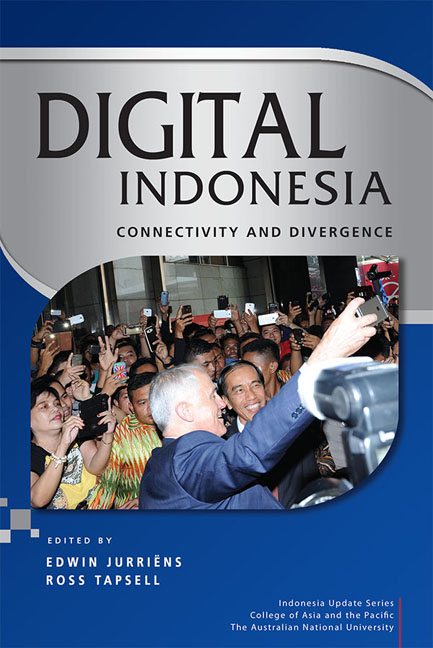Book contents
- Frontmatter
- Contents
- Tables
- Figures
- Contributors
- Acknowledgments
- Glossary
- Map of Indonesia
- 1 Challenges and opportunities of the digital ‘revolution’ in Indonesia
- PART 1 CONNECTIVITY
- PART 2 DIVERGENCE
- PART 3 IDENTITY
- PART 4 KNOWLEDGE
- 11 Digitalising knowledge: education, libraries, archives
- 12 Digital art: hacktivism and social engagement
- PART 5 COMMERCE
- Index
- Indonesia Update Series
12 - Digital art: hacktivism and social engagement
from PART 4 - KNOWLEDGE
Published online by Cambridge University Press: 12 January 2018
- Frontmatter
- Contents
- Tables
- Figures
- Contributors
- Acknowledgments
- Glossary
- Map of Indonesia
- 1 Challenges and opportunities of the digital ‘revolution’ in Indonesia
- PART 1 CONNECTIVITY
- PART 2 DIVERGENCE
- PART 3 IDENTITY
- PART 4 KNOWLEDGE
- 11 Digitalising knowledge: education, libraries, archives
- 12 Digital art: hacktivism and social engagement
- PART 5 COMMERCE
- Index
- Indonesia Update Series
Summary
A remarkable development in Indonesian art since the early 1990s has been the experimentation with unconventional new media such as video, the internet, the mobile phone and biotechnology. This is a product of global trends in art and the media, the enhanced accessibility of consumer technology in Indonesia and the increased freedom of speech since the fall of Suharto's totalitarian New Order regime (1965–98). Digitalisation here is not merely about new electronic communication strategies and financial transactions surrounding art, but affects art at the very core of its production, circulation and appreciation. Thus, contemporary art and the broader creative economy to which it belongs constitutes an important form of expression and area of social life—on a par with electronic finance, governance, health care and education—for analysing and putting into critical perspective the idea of a digital revolution in Indonesia.
This chapter is meant as an early inquiry into the much flagged idea of a digital revolution, by putting both the ‘digital’ and the ‘revolution’ into critical perspective. I discuss how the contemporary art market, as an essential part of Indonesia's creative economy, has been shifting interest from traditional media such as painting and sculpture to new media such as digital art. Some artists and art collectives have remained under the commercial radar, however, due to the nature of their work, ideas and interests. They frequently engage in collaborative projects with local communities to creatively and critically address urgent social issues such as health care and food security. I argue that their ideas and practices are not the product of a digital revolution only, but build on a longer history of social engagement in Indonesian creative practice.
I specifically focus on the idea of ‘hacking’ in the context of Indonesian digital art. Hacking in this instance does not mean sabotaging information and communication networks, but rather creating open lab-oratories for exploring and executing alternative scenarios for more sus-tainable, socially inclusive and environmentally friendly futures. Some digital artists use new, techno-cultural hacking strategies to go beyond the market, and establish creative connections with various groups in society that are ignored or underrepresented by mainstream politics and business.
- Type
- Chapter
- Information
- Digital IndonesiaConnectivity and Divergence, pp. 207 - 224Publisher: ISEAS–Yusof Ishak InstitutePrint publication year: 2017



